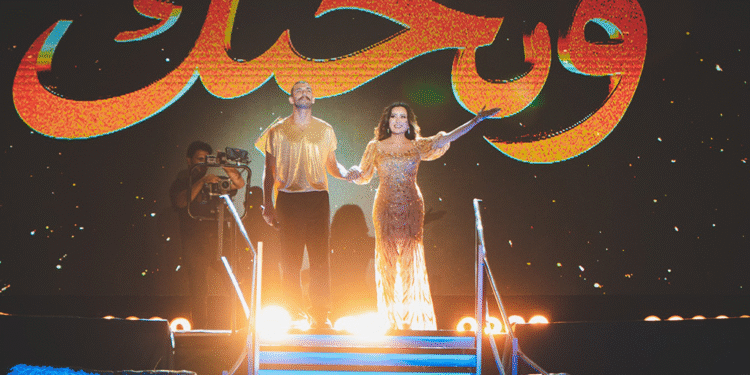On Friday, Tunisian artist Latifa Arfaoui performed at the current edition of the Carthage International Festival, coinciding with Tunisia’s 68th Republic Day. She was accompanied by the National Music Ensemble, conducted by Maestro Youssef Belhanni, in a show that blended timeless classics from her musical archive with fresh new tracks.
Latifa opened the evening by dedicating the patriotic poem “Aheem B Tounes El Khadhra, Hobban Faqa Aan Dhanni” (“I’m enamored with Green Tunisia, a love beyond my imagination”) to her homeland, Tunisia, in celebration of Republic Day, saying:
“Words cannot express the joy I feel tonight.”
During the concert, she performed a collection of beloved hits that have resonated with her fans over the years, such as:
“El Medina El Arabi,” “Ya Sidi Messi Alina,” “Hobbak Hady,” “Bahebb Fe Gharamak,” “Karhatak,” “Inshallah Terga’ Liya,” and “Ya Ghaddar.”
The audience’s connection to these songs was palpable, as the ancient theater turned into a massive choir. Latifa often sang only the opening lines or choruses while the audience sang along passionately, with a backing choir helping fill in any vocal gaps—demonstrating her ability to engage the crowd and draw energy from their enthusiasm, even as her vocal strength has diminished compared to earlier years.
From her newer releases, Latifa performed “Nhebak”, during which she draped herself in the Palestinian flag alongside the Tunisian flag, expressing deep love, pride, and gratitude for Tunisia. She also sang “Yalli Mrawwah”, which evoked the suffering of Gaza’s people and those enduring the pain of exile—proving once again that art is a platform for humanitarian causes. She continued with performances of “Redd El Bab” and “Sorry”, although the audience response was more subdued compared to her classic hits that are ingrained in Tunisia’s collective memory.
The National Music Ensemble, under Youssef Belhanni’s baton, was the night’s unsung star. The musicians delivered a performance marked by professionalism and precision, elevating the artistic value of the evening. Maestro Belhanni skillfully maintained harmony and rhythm, preventing lulls and ensuring a consistently high-quality show befitting the grandeur of Carthage Theatre.
Latifa concluded the night with a heartfelt reprise of “Aheem B Tounes El Khadhra,” in a climactic moment where her voice fused with the audience’s in a moving patriotic celebration—bringing the concert to a close and reaffirming Latifa’s enduring place in the memory of Tunisian music, even if her star now shines more brightly with echoes of the past than promises of the future.
This year, Latifa Arfaoui marks four decades in music—a journey filled with sacrifices, relentless pursuit of melodies that resonate with the public, and lyrics infused with truth and soul. Her unique blend of Eastern, Bedouin, hip-hop, and jazz styles has come to define her sound.
Throughout her career, she has collaborated with legends such as Baligh Hamdi, Ammar El Sherei, Kadim Al Sahir, and Abdelwahab Mohammed. Today, as she shared in the post-show press conference, she is betting more than ever on the young generation of musicians and creators.

